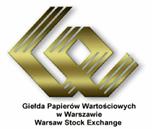Warsaw Stock Exchange

The Warsaw Stock Exchange (WSE, polish: Giełda Papierów Wartościowych w Warszawie) is a stock exchange located in Warsaw, Poland. It is the largest stock exchange in the region, with a capitalization of €120 billion (Jul 2008).
The first exchange in Warsaw, the Warsaw Mercantile Exchange, was established on May 12, 1817. The first day of trading was on May 16. Initially, trading sessions were held between 1 p.m. and 2 p.m. In the 19th century mainly bills and bonds were traded. Share trading on a broader scale developed in the second half of that century. Between 1918 and 1939, the WSE was by far the largest of several bourses in different Polish cities (Katowice, Kraków, Lwów, Łódź, Poznań and Wilno), and accounted for 90% of the volume traded on the Polish market. When the Second World War broke out, the stock exchange was closed.
It was only after the fall of the communist regime in 1989, that the Warsaw Stock Exchange could be reestablished. Much needed experience and financial aid was provided by France (especially the Société des Bourses Françaises). The WSE began activity in its present form on April 16, 1991. On the first trading day only five stocks were listed (Tonsil, Próchnik, Krosno, Kable, and Exbud). Seven brokerages took part in the trading, and there were 112 buy and sell orders, with a turnover of only 1,990 złotys ($2,000).
In the years 1991-2000, the stock exchange was located in the building which during the previous, and then recent, communist years had been the seat of the Central Committee of the ruling Polish Communist Party. This can be considered an interesting reflection on the rapid transition of Poland from a communist to a market economy.
Since then the WSE has been developing and growing rapidly and is now perceived as well established on the European market. Many economists expect that Eastern Europe will continue to be an area of rapid growth in the foreseeable future and the Warsaw Stock Exchange will be sure to benefit from the increased investment.
Poland has pursued a policy of economic liberalization since 1990 and today stands out as a success story among transition economies. In 2007, GDP grew an estimated 6.5%, based on rising private consumption, a jump in corporate investment, and EU funds inflows. GDP per capita is still much below the EU average, but is similar to that of the three Baltic states.
Since 2004, EU membership and access to EU structural funds have provided a major boost to the economy. Unemployment is falling rapidly, though at roughly 12.8% in 2007, it remains well above the EU average. Tightening labor markets, and rising global energy and food prices, pose a risk to consumer price stability. In December 2007 inflation reached 4.1% on a year-over-year basis, or higher than the upper limit of the National Bank of Poland’s target range.
Poland’s economic performance could improve further if the country addresses some of the remaining deficiencies in its business environment. An inefficient commercial court system, a rigid labor code, bureaucratic red tape, and persistent low-level corruption keep the private sector from performing up to its full potential. Rising demands to fund health care, education, and the state pension system present a challenge to the Polish government’s effort to hold the consolidated public sector budget deficit under 3.0% of GDP, a target which was achieved in 2007.
The PO/PSL coalition government which came to power in November 2007 plans to further reduce the budget deficit with the aim of eventually adopting the euro. The new government has also announced its intention to enact business-friendly reforms, reduce public sector spending growth, lower taxes, and accelerate privatization. However, the government does not have the necessary two-thirds majority needed to override a presidential veto, and thus may have to water down initiatives in order to garner enough support to pass its pro-business policies.
Sources:
[http://www.gpw.pl]
[http://en.wikipedia.org/wiki/Warsaw_Stock_Exchange]
[http://www.wse.com.pl/zrodla/gpw/pdf/rocznik2006/16.pdf]
[http://www.investopedia.com/terms/w/warsaw_stock_exchange.asp]
[http://www.cia.gov/library/publications/the-world-factbook/geos/pl.html]

Leave a comment